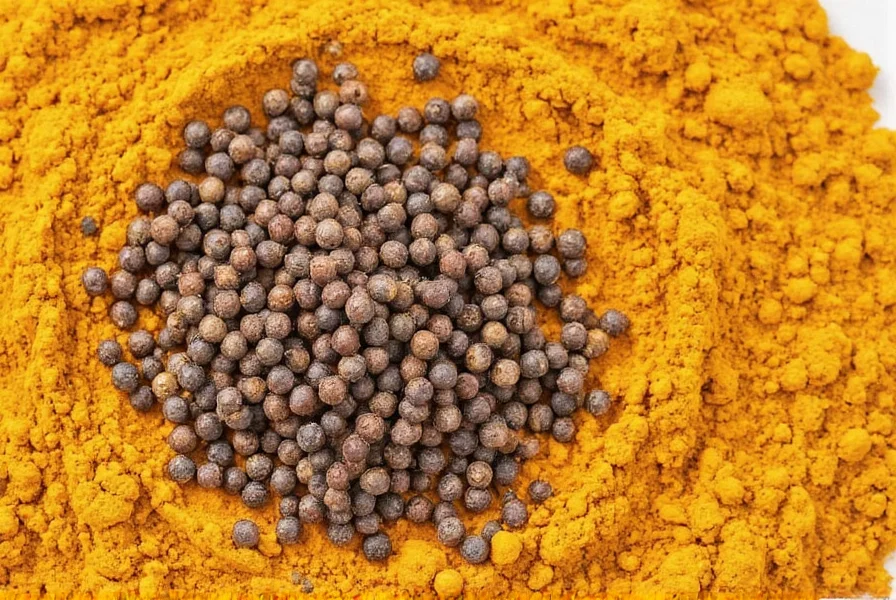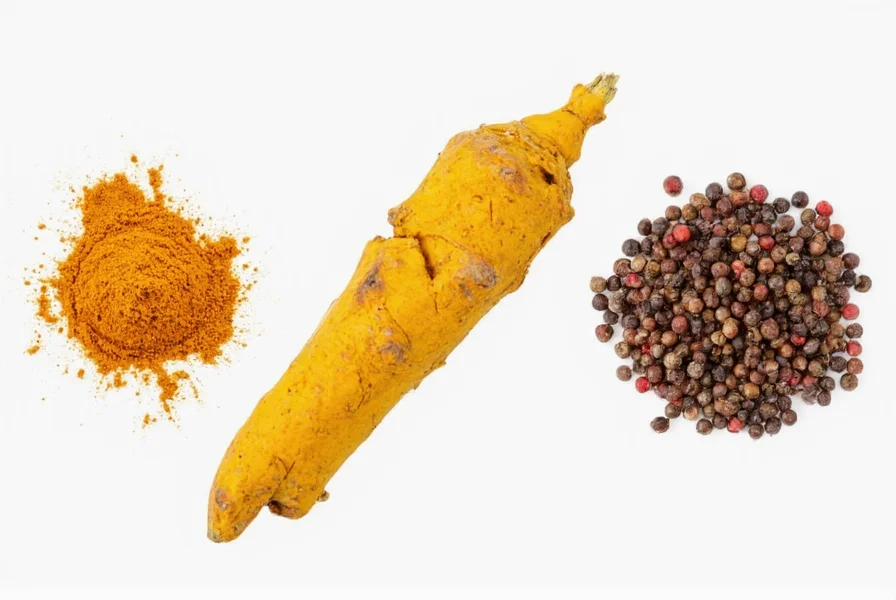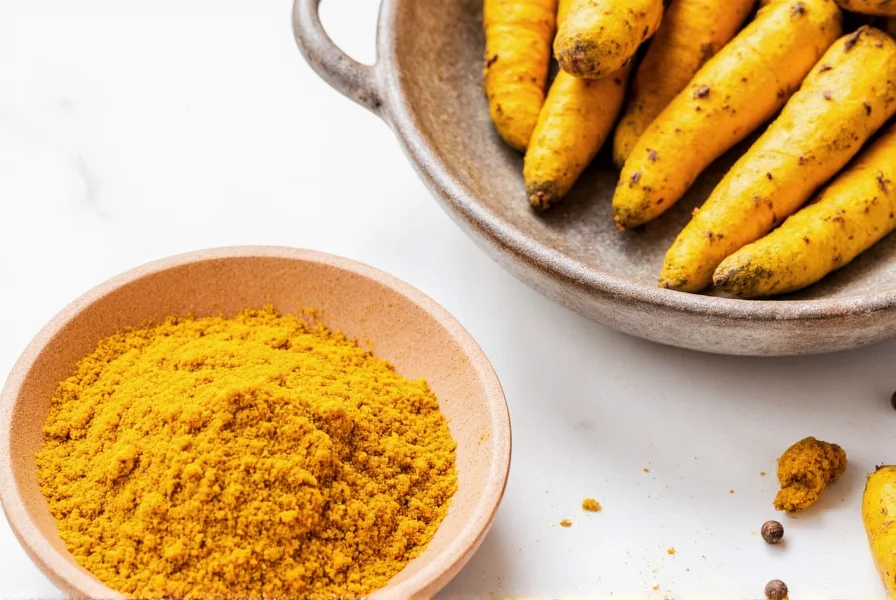Curcumin, the active compound in turmeric, has limited bioavailability when consumed alone due to rapid metabolism and poor absorption. This is where black pepper becomes essential. The piperine found in black pepper works through multiple mechanisms to dramatically improve how your body utilizes curcumin.
The Science Behind Turmeric and Black Pepper Synergy
When you consume turmeric by itself, your body struggles to absorb its beneficial compounds. Studies published in Planta Medica demonstrate that curcumin alone has extremely low systemic bioavailability. The liver quickly metabolizes it through glucuronidation, and intestinal absorption remains poor.
Black pepper contains piperine, an alkaloid responsible for its pungent taste. Research shows piperine inhibits certain enzymes in the liver (like UDP-glucuronosyltransferase) that would otherwise break down curcumin. Additionally, piperine appears to slow intestinal metabolism and may enhance intestinal absorption of curcumin.

Research Evidence on Curcumin Bioavailability
A landmark study published in 1998 examined the effects of piperine on curcumin absorption. Researchers found that when 20mg of piperine was combined with 2g of curcumin in human subjects, serum concentration of curcumin increased by 2,000% compared to curcumin alone. This dramatic improvement in bioavailability has been replicated in multiple subsequent studies.
| Study Component | Curcumin Alone | Curcumin with Piperine |
|---|---|---|
| Average Bioavailability | 1x (baseline) | Up to 20x higher |
| Serum Concentration | Low and short-lived | 2,000% higher |
| Duration in Bloodstream | Approximately 1-2 hours | Significantly extended |
Practical Considerations for Turmeric with Black Pepper
Understanding the research is one thing, but implementing it effectively requires practical knowledge. Here's what matters when combining these two ingredients:
Optimal Ratio and Dosage
Research suggests that a small amount of black pepper makes a significant difference. Most studies use approximately 5-20mg of piperine (equivalent to 1/20 to 1/5 teaspoon of black pepper) with standard curcumin doses (typically 500mg-2,000mg). You don't need large quantities of black pepper to achieve the bioavailability enhancement.
Timing Matters
For maximum benefit, consume black pepper and turmeric together. Taking them separately won't provide the same absorption enhancement. When preparing golden milk or turmeric tea, add freshly ground black pepper at the same time as the turmeric.
Forms Available
You can combine turmeric with black pepper through:
- Homemade recipes (golden milk, curries, smoothies)
- Capsule supplements specifically formulated with both ingredients
- Fresh turmeric root with freshly ground black pepper
Potential Benefits of the Enhanced Combination
While curcumin has been studied for various potential health properties, the enhanced bioavailability from adding black pepper means your body can potentially utilize more of these compounds. Research has examined curcumin's potential effects on:
- Inflammatory processes in the body
- Joint comfort and mobility
- Antioxidant activity
- Cellular health pathways
It's important to note that while research is promising, curcumin is not a treatment or cure for any medical condition. The combination simply makes the available curcumin more bioavailable to your system.
Safety Considerations
The turmeric-black pepper combination is generally well-tolerated by most people at culinary doses. However, consider these points:
- High doses of black pepper may cause gastrointestinal discomfort in sensitive individuals
- Piperine can affect how certain medications are metabolized
- Those with gallbladder issues should consult healthcare providers before high-dose turmeric
- Pregnant or breastfeeding women should discuss with their healthcare provider

Incorporating Turmeric with Black Pepper into Daily Routine
Adding this powerful combination to your daily routine is simple and versatile:
- Golden Milk: Heat 1 cup milk (dairy or plant-based) with 1/2 teaspoon turmeric, 1/20 teaspoon black pepper, and optional cinnamon
- Smoothies: Add 1/4-1/2 teaspoon turmeric and a pinch of black pepper to fruit or green smoothies
- Curries and Sauces: Always include freshly ground black pepper when using turmeric in cooking
- Simple Tea: Steep 1/4 teaspoon turmeric powder and a pinch of black pepper in hot water for 10 minutes
Common Misconceptions Clarified
Several myths surround turmeric with black pepper. Let's address them with evidence-based information:
- Misconception: You need large amounts of black pepper
Reality: Research shows even small amounts (5-20mg piperine) significantly enhance absorption - Misconception: Any form of black pepper works equally well
Reality: Freshly ground pepper provides more active piperine than pre-ground spice - Misconception: The combination creates new compounds
Reality: It simply enhances absorption of existing curcumin compounds - Misconception: Turmeric with black pepper is a miracle cure
Reality: It improves bioavailability but doesn't change curcumin's fundamental properties
Conclusion: Maximizing Turmeric's Potential
The combination of turmeric with black pepper represents one of the best-documented examples of food synergy in nutritional science. By understanding the piperine-curcumin relationship, you can make more informed choices about how to incorporate these spices into your lifestyle.
Remember that while the bioavailability enhancement is scientifically established, individual responses may vary. The most effective approach combines culinary use of these spices with realistic expectations about their potential benefits. For those using turmeric supplements, checking for piperine inclusion can significantly impact how your body utilizes the curcumin.











 浙公网安备
33010002000092号
浙公网安备
33010002000092号 浙B2-20120091-4
浙B2-20120091-4